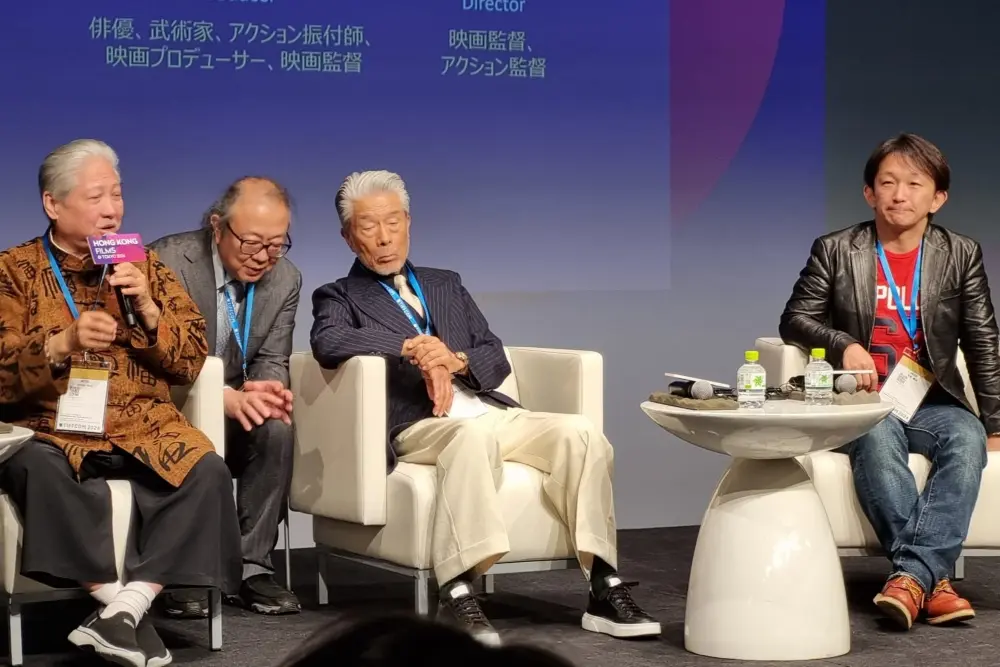A nostalgic journey through Hong Kong’s martial arts cinema
Veteran action stars reunite in Tokyo
Veteran action movie legends Sammo Hung, Japanese actor Kurata Yasuaki, and action choreographer-turned-director Tanigaki Kenji gathered for a spirited panel discussion recently in Tokyo. They shared engaging insights and fond memories, shedding light on the evolution and ongoing influence of Hong Kong martial arts films.
Reflecting on the past, present, and future
In a panel held during TIFFCOM, a rights market aligned with the Tokyo International Film Festival, Hung, Kurata, and Tanigaki were chosen to represent different eras of the martial arts genre. Each brought unique perspectives that highlighted their extensive contributions to this dynamic field.
“As Hung proudly remarked, Hong Kong’s standing in the film industry is well-earned, a product of immense hard work and dedication. ‘Nobody paid attention to us for ages, so we could do what we liked. Then, our time came.’ His words resonated deeply as he spoke of an industry that developed its identity under the radar before emerging onto the global stage.
Sammo Hung: A storied career
Hung, whose real name is Hung Kam-bo, boasts an impressive filmography with over 250 credits, including roles as an actor, stuntman, producer, and director. One of his latest successes, ‘Twilight of the Warriors: Walled In,’ broke box office records in Hong Kong and was selected as the territory’s Oscar contender. The film, a gripping action drama, is currently screening in Tokyo, symbolizing the enduring appeal of Hong Kong’s unique style.
Hung reminisced about his humble beginnings and grueling training sessions. This dedication not only propelled his career but also elevated Hong Kong cinema to new heights, paving the way for a ‘Golden Age’ of action films that spanned over two decades from the mid-1970s.
Kurata Yasuaki: From doubt to acclaim
Kurata Yasuaki shared his initial experiences in Hong Kong cinema, recalling his bewilderment during his debut in 1968. ‘I was surprised by the volume of martial arts in my first film. It was unlike Japan where action scenes were limited,’ said Kurata. He vividly described the painstaking perfectionism that characterized Hong Kong film productions, with directors like Sammo Hung and Jackie Chan often requiring up to 60 takes for a single scene.
Despite initial doubts, Kurata eventually embraced the rigorous demands of Hong Kong cinema. He declined an annual studio contract to pursue various martial arts roles, including his notable performance in the 1985 film ‘Twinkle Twinkle Lucky Stars,’ directed by Hung. Kurata fondly listed it among his top three Hong Kong film titles, a testament to the lasting impact of these films.
Tanigaki Kenji: Bridging cultures
Tanigaki Kenji, who studied at a film academy in Osaka and built his career in Hong Kong, offered valuable insights into the industry’s intricate systems. ‘They have a very good system. Action directors, choreographers, and editors are very established. They are experts in their field, trained to have an understanding of the whole process,’ said Tanigaki. He emphasized the importance of learning Cantonese to fully integrate himself into the Hong Kong film-making milieu.
Tanigaki also addressed the challenge of contending with various martial arts styles, from Beijing Opera to Wing Chun and Taekwondo. ‘I had to do more than that. I had to design movement,’ he explained. Drawing inspiration from Chinese cartoons, he explored innovative movements, underscoring the idea that ‘effort will never betray you.’
Looking ahead: Modern influences
Currently, Tanigaki is in post-production for ‘The Furious,’ a high-budget action film shot this summer in Thailand with a pan-Asian cast. Producer Bill Kong insists that while the film was shot in Thailand, it remains deeply influenced by Hong Kong’s distinctive action style. ‘That action is now embedded in our bodies,’ Tanigaki noted, highlighting the global influence of Hong Kong martial arts.
A vibrant discussion and future prospects
The vibrant discussion concluded with audience questions about preserving, promoting, and teaching Hong Kong martial arts. Hung’s response was characteristically enthusiastic: ‘Buy tickets to Hong Kong movies. Rent the whole theater.’
Join the conversation and share your thoughts about the enduring legacy of Hong Kong martial arts films. Follow us for more updates on the latest news in the world of cinema.

 Italian
Italian







